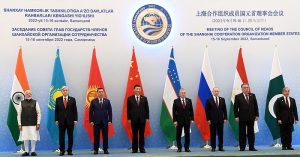Last week, Pakistan reportedly did not participate as scheduled in a seminar on the contributions of armed forces to medicine, healthcare, and pandemic response held under the Shanghai Cooperation Organization (SCO) umbrella.
India, currently president of the SCO (and also the G-20), has hosted a series of events for member states and will continue to do so in the run-up to the organization’s foreign ministers summit, scheduled for May in Goa. In January, India extended an invitation to the Pakistani foreign minister to attend the May meeting, but as recently as March 10 the Pakistani Foreign Ministry said that no decisions had been made.
The incident last week dredges up concerns that have dogged the SCO since India and Pakistan began the accession process in 2015 and were formally admitted as members in 2017 that their bilateral disagreements would inject instability into the organization.
A Pakistani delegation was reportedly scheduled to attend a March 21 event, titled “SCO Armed Forces Contribution in Military Medicine, Healthcare and Pandemics” and hosted by the Indian Institute for Defense Studies and Analysis (IDSA) in New Delhi. But ultimately the Pakistanis did not attend.
Precisely what happened depends on which reports you read, but both sides seem to agree that the bone of contention was a map.
The Express Tribune, a Pakistani newspaper, began its report with a statement that “India denied Pakistan’s participation” in the event, although later in the same article it cited Indian media as reporting that the Pakistani delegation chose to stay away: “According to Indian media reports, New Delhi objected to the map used by the Pakistani side, showing Jammu and Kashmir as its territory. After the matter came to the Indian external affairs ministry’s notice, the Pakistani side was asked to show the ‘correct map’ or to stay away from the seminar.”
The Tribune cited an unnamed source accusing India of misusing its position and acting “irresponsibly.” The article closed with an unattributed statement that “Pakistan has urged India not to exploit its SCO chairmanship to advance its self-serving objectives and politicize the organization.”
The Deccan Herald, a Karnataka-based Indian newspaper, reported that India’s delegation had objected to the Pakistani map, “and asked the counterparts from Pakistan to replace the map with the genuine one. Pakistan, however, pulled out of the SCO meeting hosted by India, instead of changing the map.”
Whether this incident has legs will be reflected in future, more critical venues. The Hindustan Times reported this week that Pakistan had decided “in principle” to participate in three upcoming SCO meetings: the SCO national security advisors meeting on March 29; the meeting of SCO defense ministers scheduled for April 27-29; and the foreign ministers confab set for May 4-5.
Pakistan is expected to participate in the SCO NSA meeting this week virtually, though the country does not have a serving NSA. Moeed Yusuf stepped down from the position last April following the ouster of Prime Minister Imran Khan. The government of Shehbaz Sharif has not appointed a new NSA.
The formal SCO Summit, typically attended by the members’ top leaders, is to be held in July. It’s not clear whether Sharif will attend but whether he does or not will be a closely watched decision.
Although there are these occasional flares of bilateral tension within the SCO, there are corresponding moments in which member states gloss over the rough patches. Last month, Javairyah Kulthum Aatif argued in an article for The Diplomat that “Pakistan’s choice to attend or not to attend the SCO summit in India will … send signals to internal and external audiences on multiple levels.” Attending the summit could dovetail with other domestic troubles and generate a backlash, but at the same time attending would keep Pakistani on track when it comes to maintaining relations with China and embattled Russia, which together anchor the SCO.
It’s important to note that the Indian and Pakistani prime ministers both attended the last SCO leaders summit in Samarkand, Uzbekistan, in September 2022. The upcoming summit, however, will be the first hosted by India following its joining the SCO, lending another layer of importance to the event for New Delhi.
The SCO’s current membership roster includes China, Russia, Kazakhstan, Kyrgyzstan, Tajikistan, Uzbekistan, India, and Pakistan. Iran, which began the accession process in 2021, is expected to join as a full member this year, following approval in the Iranian parliament in November 2022.

































